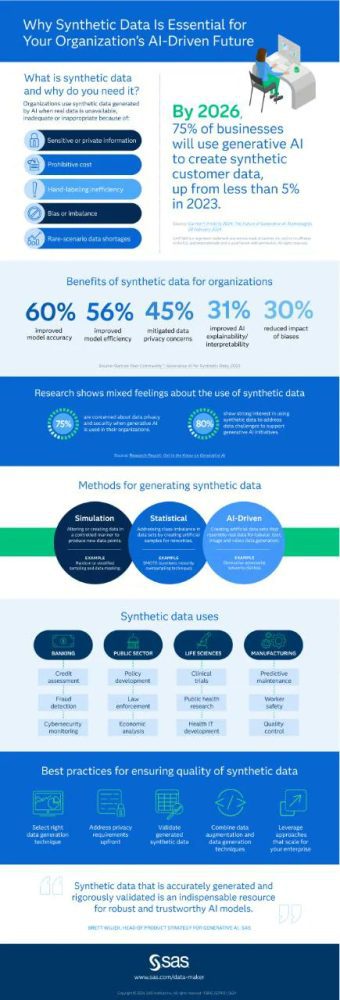The Importance of Synthetic Data in Generative AI
In the rapidly evolving landscape of Artificial Intelligence (AI), synthetic data has emerged as a crucial element for enterprises aiming to enhance their Generative AI portfolios. Synthetic data, which is artificially generated rather than obtained by direct measurement, offers numerous advantages, particularly in the realm of Generative AI. This data is essential for training AI models, especially when real-world data is scarce, expensive, or fraught with privacy concerns.
One of the key benefits of synthetic data is its ability to preserve privacy while enabling diverse use cases. For instance, DataCebo has launched an enterprise version of its popular open-source synthetic data library, which allows enterprises to generate high-quality synthetic data at scale. This innovation is particularly beneficial for industries dealing with sensitive information, such as healthcare and financial services.
Enhancing AI Model Training with Synthetic Data
Generative AI models, such as those used for content creation, design, and customer service, require vast amounts of data for training. However, acquiring and labeling real-world data can be a daunting and costly task. Synthetic data addresses this challenge by providing a scalable and cost-effective solution. According to TechCrunch, 39% of companies express concerns about data availability as a barrier to AI implementation. Synthetic data can mitigate these concerns by offering a reliable alternative.
Moreover, synthetic data can be tailored to specific use cases, ensuring that AI models are trained on relevant and representative datasets. This customization enhances the accuracy and performance of AI models, leading to better outcomes in various applications, from self-driving cars to IoT devices.
Addressing Privacy and Ethical Concerns
Data privacy regulations, such as GDPR and CCPA, have heightened the need for privacy-preserving technologies. Synthetic data plays a pivotal role in this context by enabling enterprises to comply with these regulations while still leveraging data for AI development. By using synthetic data, companies can avoid the risks associated with handling real-world data, such as data breaches and privacy violations.
For example, Gartner predicts that synthetic data will reduce the collection of personal customer data, avoiding 70% of privacy violation sanctions by 2025. This highlights the growing importance of synthetic data in ensuring responsible AI development and deployment.
Overcoming Challenges in AI Implementation
Despite the numerous benefits of synthetic data, many enterprises are still cautious about adopting Generative AI. According to TechCrunch, only 10% of companies have implemented Generative AI projects at scale. This cautious approach is often due to concerns about data quality, governance, and the ability to demonstrate ROI.
However, companies like Databricks are addressing these challenges by offering platforms that integrate data governance and AI model management. These solutions help enterprises build and deploy AI applications more effectively, ensuring that synthetic data is used responsibly and efficiently.
The Future of Synthetic Data in AI
As AI continues to evolve, the role of synthetic data will become increasingly significant. Enterprises that leverage synthetic data will be better positioned to innovate and compete in the AI-driven future. By addressing data privacy concerns, enhancing AI model training, and overcoming implementation challenges, synthetic data is set to transform the landscape of Generative AI.
In conclusion, synthetic data is not just a supplementary tool but a fundamental component for enterprises aiming to thrive in the AI-driven future. Its ability to provide high-quality, privacy-preserving data at scale makes it indispensable for developing robust and effective AI models.
Related Articles
- The Age of Generative AI: How to Land Exciting New Careers in This Era
- Strengthening Data Security in Modern Analytics: Challenges and Solutions
- How to Leverage Generative AI for Cutting-Edge Website Design in 2024: Tools, Trends, and Best Practices
- Leveraging AI for a Sustainable and Innovative Workplace
- How AI is Revolutionizing B2B Data Analytics
Looking for Travel Inspiration?
Explore Textify’s AI membership
Need a Chart? Explore the world’s largest Charts database
